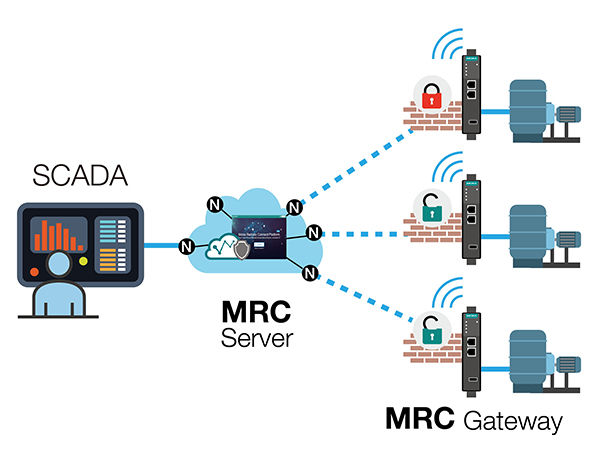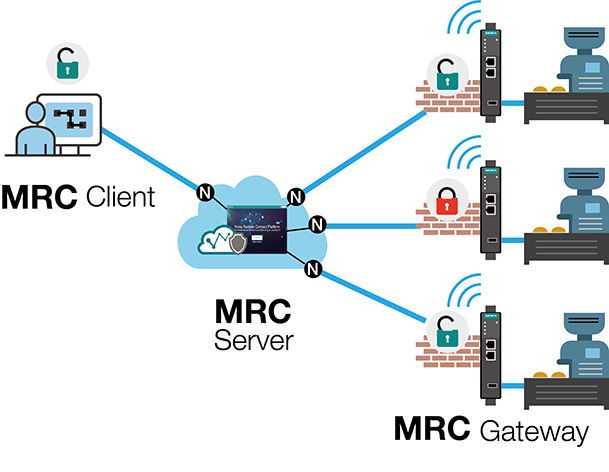Remote maintenance and troubleshooting services are enabling original equipment manufacturers (OEMs) and machine builders to support their customers with greater efficiency, as well as helping them to enhance productivity. These remote services not only facilitate faster and smarter decisions, but also reduce the time and cost of after-sales support and maintenance for machines and equipment.
Although using a virtual private network (VPN) to remotely access off-site industrial machines and equipment is not a new technology, OEMs and machine builders are often faced with additional challenges such as various customer privacy concerns, complex VPN settings, IP address management, and compliance with IT security standards.
To overcome these challenges, cloud-based remote connections can provide easy, secure, and flexible remote access to customers’ machines and equipment. We will now consider two common scenarios and see how they can benefit from secure cloud-based remote connections.
Scenario 1: Remote Data Acquisition
In a water treatment plant, raw water has to go through a treatment and purification process in order to produce potable water that is safe for human consumption. To achieve this, thousands of sensors are deployed to measure the quality of the water. The sensors are located at hundreds of facilities and all need to be reliably monitored. In addition to water treatment and purification, the handling and distribution of water after it is processed is equally important to ensure the water continues to be safe for human consumption.
A common practice to avoid recontamination of water in the distribution system is the retention of residual disinfectants in the treated water. To ensure that the disinfectants do not reach dangerous levels, the water is continually monitored by sensors placed in the pipes. The sensors in the pipes send data through SCADA systems to equipment installed inside roadside cabinets along the distribution lines. Another benefit of these systems is that they allow the quantity of water consumed by each household or facility to be monitored to ensure appropriate billing. Traditional VPN is often used at these facilities, but it is hard to scale up and manage as more and more houses or facilities are built and need to have their water supply monitored.
Why Cloud-based Remote Connections
Due to the highly distributed topology, cloud-based remote communications can provide an easier and cheaper way for water and wastewater treatment centers to extract data. Cloud-based remote communications alleviate the burden of setting up and purchasing additional VPN servers and clients when there is a new field site that needs to be monitored, as well as avoiding the cost of obtaining public IP addresses required for each VPN server and client. Furthermore, the management of certificates for each connection is simpler when using cloud-based remote communications.

Scenario 2: Remote Maintenance
Food processing machines are used to automate the large-scale production and processing of food. In order for food manufacturers to expand their business, it is essential that their machines do not experience network downtime. Companies that are involved in the production of food hope that the OEM can provide a very quick response time when machine maintenance is required in order to ensure any issues with the machines do not influence operations. In order to ensure that the response times are quick enough to prevent interfering with normal manufacturing operations, machine builders need a secure and more efficient method to troubleshoot and perform maintenance tasks without having to dispatch personnel to each site.
Why Cloud-based Remote Connections
Granting unrestricted remote access to machines on the production floor would subject business owners to unacceptable security risks and leave them vulnerable to cyberattacks. Fortunately, cloud-based remote access not only allows engineers to perform many maintenance tasks without having to travel to each customer’s factory in person, but also allows customers to control access to their network. One option that is available for machine builders is to provide their customers with a physical key, which has to be activated in order for the machines to be accessed remotely. Customers can also restrict which programs in a machine can be used by remote service engineers. In addition, customers can also restrict remote connections to specific network segments so that off-site support engineers do not have access to the entire network.

The Current Challenge
Although cloud-based remote access offers clear benefits to IIoT customers, operational technology (OT) engineers, water and wastewater treatment managers, and machine builders may find it cumbersome to set up and maintain their own cloud servers to provide new services and applications. Indeed, there is considerable effort associated with setting up new infrastructure, even if it is in the cloud.
Convenient Secure Cloud Services
Fortunately, OEMs and machine builders can now deliver secure cloud-based services and remote access to their customers without having to maintain their own cloud servers. In particular, Moxa Remote Connect (MRC) gateways offer the MRC Quick Link option to provide easy, secure, and flexible remote access to machines and equipment over the cloud. Simply activate MRC Quick Link by registering your MRC gateway on the Moxa Software License Portal, and you will receive five concurrent online nodes and 5 GB of data per month for each MRC Quick Link that is activated.
To learn more about how MRC Quick Link meets various communication requirements and enables remote access with flexibility that scales, please visit the Moxa Remote Connect microsite.